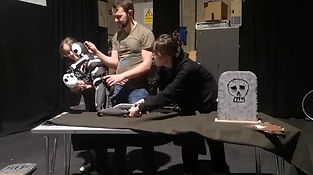top of page
JINAH KIM
PROJECT1. PUPPETRY
Initial research about puppetry


Life drawing




Life drawing helped me understand how human body is structured and how those body parts change as they move. It was helpful to make a puppet with a human body and learn how to move it.
Making process



Our team tried to make the biggest puppet, so we used polystyrene as an main material. First, we glued two blocks of polystyrene using templetes and dried. After it dried, we cut it off roughly then shaped to look like a body part using surforms and sandpaper. All body parts including a head, torso and bottom were made in this way.








Inspiration





Lighting






Puppet movement
We learned how our puppet move to look like an animated skeleton and made choreography based on that. For our puppetry, we practiced the movements over and over again.
Final outcome
Reflection
It was my first project related to the theare design. I learned not only how to handle polystyrene for making a puppet but also the whole process of making it step by step. It was a little bit tricky to deal with the material at first but interesting at the same time. Practicing the movements of the puppet was really enjoyable, too. Also, there was an opportunity to perfrom our own puppetry, so we discussed a lot about a story, choreography, lighting and so on. There were lots of things we have to choose to make about five minutes show. Through this project, I can learn how to collaborate with other people. I'd like to think of great ideas more next project.
Reference
Blumenthal, E. 2005. Puppetry and puppets: An Illustrated World Survey. London: Thames and Hudson.
Silly Symphonies - The Skeleton Dance. 2015. [Video]. Youtube. Available at: https://youtu.be/vOGhAV-84iI [Accessed 13 November 2023].
bottom of page